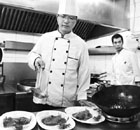Society
Rosy job prospects fail to attract men to nursing
(Xinhua)
Updated: 2010-05-11 20:29
 |
Large Medium Small |
BEIJING - Wang Yunshui still finds it hard to deal with women in his professional life.
"Some of them just excuse themselves to the ladies room and ask the head nurse for a female nurse," says Wang, the only male among 350 nurses at a city hospital in southeast China.
"But it is perfectly alright for them to accept male doctors who wear the same green coats as ours."
Since graduating last year from Nanchang University, in the eastern province of Jiangxi with a junior college degree, Wang, 23, works in the intensive care unit (ICU) at the hospital in Shaowu, Fujian Province.
Though his job differs little from that of his female colleagues, including the usual patient registration, injections and changing intravenous drips, Wang says the pressure and stress are far greater.
Most Chinese still hold a deep-rooted view that nursing is women's work, he says.
"And some patients just treat us, including female nurses, like servants," Wang says. "It is a hard thing to swallow sometimes."
According to the Ministry of Health, China had 2.18 million nurses at the end of 2009, but there are no official statistics for the proportion of males in the field.
"Many people look astonished, sometimes amused, when they hear I'm a nurse," Wang says.
"I tell them proudly: don't you know male nurses are highly sought after?"
That's because male nurses have physical advantages, says Wei Jingyun, deputy secretary of the Party Committee with the School of Nursing at the Beijing-based Capital Medical University.
"For example, when it comes to lifting or helping move patients, male nurses are always more handy than females," she says.
Male nurses can handle emergency situations more calmly, and be of great assistance fixing medical equipment, making them especially popular in ICUs, operating rooms, psychiatry and emergency departments.
"Despite the worsening overall employment prospects for Chinese college graduates, all the male graduates in our major are employed by leading hospitals," Wei says.
"But the supply still falls short of hospital demand."
Wei says the Capital Medical University will set up a doctoral program in nursing this year, which, hopefully, will make nursing more attractive for highly-educated men.
A total of 27 male students were enrolled at the Capital Medical University's nursing school in 2009, together with 103 women. Only 11 males were enrolled in 2002 when they were first admitted.
But even the rosy job opportunities cannot compensate for the pressure and stress of the job.
Cheng Gen, deputy director of the nursing department at Beijing Anding Hospital, a leading psychiatric center, says, "I was among the only two out of seven male graduates from my school who still work as a nurse.
"The rest are either selling medical equipment and instruments or health care products," he says. His hospital employs 99 male nurses.
Cheng gained his undergraduate degree in nursing from the Peking Union Medical College in 2000 and his postgraduate degree in 2007.
"Nursing is really challenging, not just simple patient care and merely taking orders from doctors," says Cheng.
Cheng often designs training schemes for staff nurses on communication skills and professional techniques necessary for psychiatric patients.
"Male nurses have the same training as any other staff nurse and are an integral part of patient care no matter in what department," Cheng says.
Sitting in a dorm filled with medical journals, Wang Yunshui is preparing for the college entrance exams next year to get a bachelor degree in nursing, and his long term goal is to be a head nurse and then head of a nursing department.
"Quite a lot of my male classmates did not even take up nursing after graduation, and most of those who did are eager to find new jobs," says Wang. "They think nursing is low-end and feminine."
Wang has a monthly salary of 650 yuan (US$95) in his two-year trial period and will earn around 1,000 yuan after that. Housing prices in Shaowu are approaching 4,000 yuan (US$586) per square meter.
"I dreamed of being a Chinese teacher as a child, but I still can serve the people as a nurse."







